Ivan Mozzhukhin and Nathalie Kovanko were the stars of the French-German silent film Michel Strogoff (Victor Tourjansky, 1926), based on Jules Verne's classic novel. In many European countries, postcards were published for this classic adventure film.
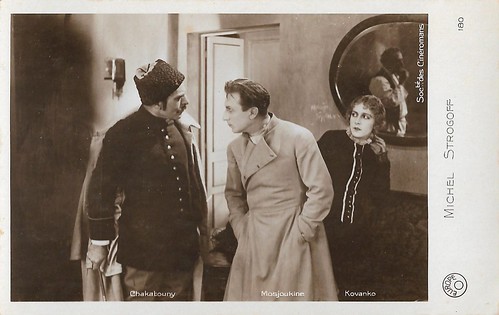
French postcard by Europe, no. 180. Photo: Société des Cinéromans. Ivan Mozzhukhin, Nathalie Kovanko and Acho Chakatouny in Michel Strogoff (Victor Tourjansky, 1926).
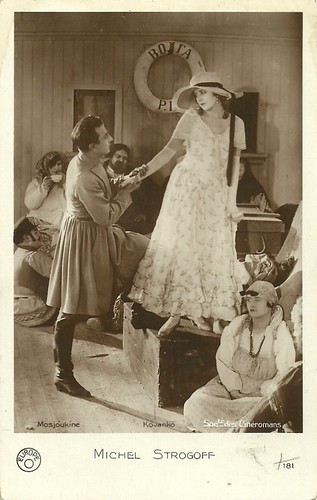
French postcard by Europe, no. 181. Photo: Société des Cinéromans. Ivan Mozzhukhin and Nathalie Kovanko in Michel Strogoff (Viktor Tourjansky, 1926).
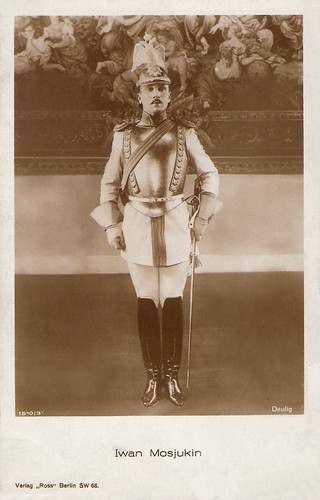
German postcard by Ross Verlag, no. 1510/3, 1927-1928. Photo: Deulig. Ivan Mozzhukhin in Michel Strogoff (Victor Tourjansky, 1926).

German postcard by Ross Verlag, no. 1512/1, 1927-1928. Photo: Deulig. Postcard for Michel Strogoff (Viktor Tourjansky, 1926). Nadia Fedor (Nathalie Kovanko) consoles Michel Strogoff (Ivan Mozzhukhin) after he is blinded.

Austrian postcard by Iris-Verlag no. 574. Photo: Micheluzzi-Film. Ivan Mozzhukhin and Nathalie Kovanko in Michel Strogoff (Viktor Tourjansky, 1926).
Jules Verne wrote Michel Strogoff/Michael Strogoff: The Courier of the Czar in 1876, and it is considered one of his best books. The book was later adapted to a play, by Verne himself and Adolphe d'Ennery. Incidental music to the play was written by Alexandre Artus in 1880. The book has been adapted several times for films, television, and even cartoon series.
One of the best versions is this French-German silent film, made by exiles from the Russian Revolution of 1917 under the direction of Victor Tourjansky, shortly before his emigration to Hollywood. The film's art direction was by Eduardo Gosch, César Lacca, Alexandre Lochakoff, Vladimir Meingard, and Pierre Schild who recreated the atmosphere of the mid-nineteenth century Russian Empire.
Tourjansky's screenplay follows Jules Verne's novel to the letter. In 1860s Russia, invading Tartars cut off all telecommunications between the border cities and the capital. The czar (Vladimir Gajdarov) sends the young captain Michael Strogoff (Ivan Mozzhukhin) to deliver a vital message to the last line of defense. Along the way, he finds love with the practical Nadia (Nathalie Kovanko), a woman trying to visit her exiled father in Siberia, and danger from the traitorous Ivan Ogareff (Acho Chakatouny), who wants to stop him at all costs. Hal Erickson at AllMovie: "Strogoff is captured by The Grand Khan (Boris de Fas), who prepares to shove hot pokers in the hero's eyes while Strogoff's mother (Jeanne Brindeau) looks on helplessly. Despite these and other perils, Strogoff completes his mission and wins the hand of the beautiful Nadia."
Michel Strogoff (Viktor Tourjansky, 1926) was a co-production by Ciné France, Deulig Europa-Produktion and Films de France. This huge production, easily rivalling Hollywood's biggest, represents the European film industry at it's most accomplished. 4,000 soldiers, including cavalrymen, were loaned by the Latvian army to portray the Russian and Tartar armies, and the battles were filmed outside Riga on large plains, which simulated the Siberian steppes.
The result is a wonderfully exciting historical adventure, full of epic sweep, pulsating action, intrigue, romance, and even a little comedy relief. The silent film was a big hit in its time. Despite a 3 hour length, the pace never flags and the story is compelling throughout. Technically the film was cutting edge 1926-style, with its use of colour and tinting and some dazzling editing of the type associated with Abel Gance and Sergei Eisenstein.
Another strong asset of the film is the charismatic performance of Ivan Mozhukhin, who according to reviewer Hamilton65 at IMDb "draws us effortlessly into Strogoff's mission to reach the Tsar in time to save the empire from the Tartars. From his first appearance, Mozhukhin exerts a magnetic hold on our attention. He never overplays, yet conveys a wide range of emotions and thoughts with the subtlest of movements."
With the coming of sound, Michel Strogoff (Viktor Tourjansky, 1926) got virtually forgotten. Renée Lichtig made for the Cinémathèque française a superb restoration which returned the film to its proper state.
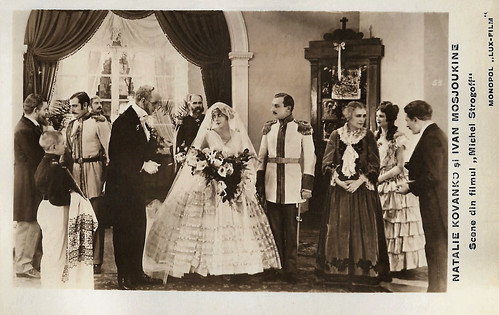
Romanian postcard by Editura Librariei SOCEC & Co. S.A., Bucuresti, no. 53. Photo: Monopol "Lux-Film". Ivan Mozzhukhin and Nathalie Kovanko in Michel Strogoff (Viktor Tourjansky, 1926).
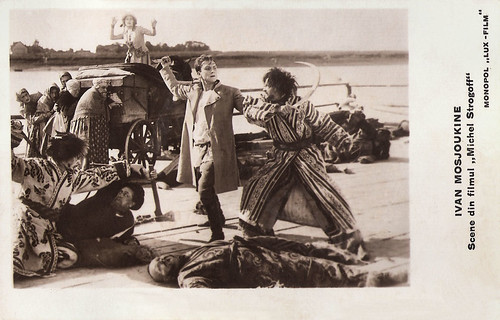
Romanian postcard by Editura Librariei SOCEC & Co. S.A., Bucuresti. Photo: Monopol "Lux-Film". Ivan Mozzhukhin in Michel Strogoff (Victor Tourjansky, 1926).
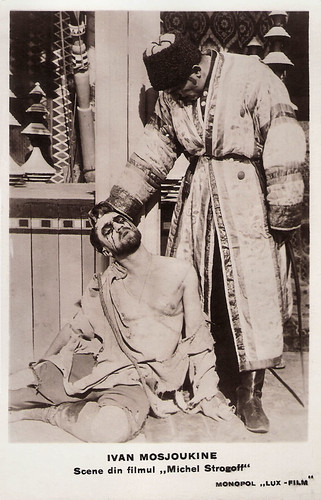
Romanian postcard by Editura Librariei SOCEC & Co. S.A., Bucuresti. Photo: Monopol "Lux-Film". Ivan Mozzhukhin in Michel Strogoff (Victor Tourjansky, 1926).
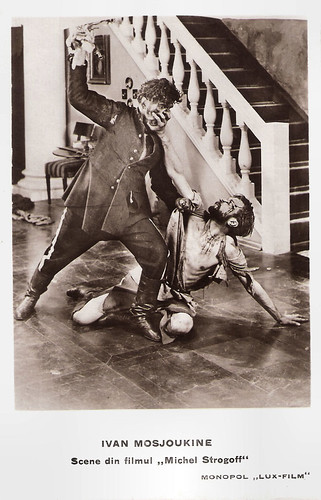
Romanian postcard by Editura Librariei SOCEC & Co. S.A., Bucuresti. Photo: Monopol "Lux-Film". Ivan Mozzhukhin in Michel Strogoff (Victor Tourjansky, 1926).
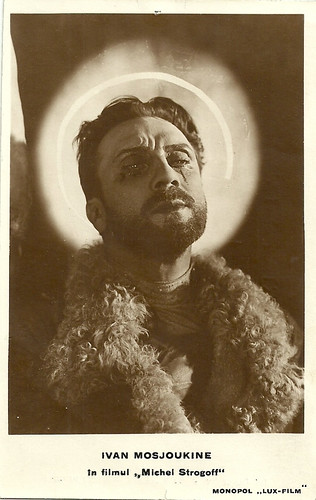
Romanian postcard by Editura Librariei SOCEC & Co. S.A., Bucuresti. Photo: Monopol "Lux-Film". Ivan Mozzhukhin in Michel Strogoff (Victor Tourjansky, 1926).
A rough transfer of the ballroom scene from Michel Strogoff (1926) from a 9.5m print, including a section missing from the restoration. The score is Glinka's Valse Fantasie. Source: Christopher Bird (YouTube).
Sources: Hamilton65 (IMDb), Hal Erickson (AllMovie), Wikipedia, and IMDb.

French postcard by Europe, no. 180. Photo: Société des Cinéromans. Ivan Mozzhukhin, Nathalie Kovanko and Acho Chakatouny in Michel Strogoff (Victor Tourjansky, 1926).

French postcard by Europe, no. 181. Photo: Société des Cinéromans. Ivan Mozzhukhin and Nathalie Kovanko in Michel Strogoff (Viktor Tourjansky, 1926).

German postcard by Ross Verlag, no. 1510/3, 1927-1928. Photo: Deulig. Ivan Mozzhukhin in Michel Strogoff (Victor Tourjansky, 1926).

German postcard by Ross Verlag, no. 1512/1, 1927-1928. Photo: Deulig. Postcard for Michel Strogoff (Viktor Tourjansky, 1926). Nadia Fedor (Nathalie Kovanko) consoles Michel Strogoff (Ivan Mozzhukhin) after he is blinded.

Austrian postcard by Iris-Verlag no. 574. Photo: Micheluzzi-Film. Ivan Mozzhukhin and Nathalie Kovanko in Michel Strogoff (Viktor Tourjansky, 1926).
A magnetic hold on our attention
Jules Verne wrote Michel Strogoff/Michael Strogoff: The Courier of the Czar in 1876, and it is considered one of his best books. The book was later adapted to a play, by Verne himself and Adolphe d'Ennery. Incidental music to the play was written by Alexandre Artus in 1880. The book has been adapted several times for films, television, and even cartoon series.
One of the best versions is this French-German silent film, made by exiles from the Russian Revolution of 1917 under the direction of Victor Tourjansky, shortly before his emigration to Hollywood. The film's art direction was by Eduardo Gosch, César Lacca, Alexandre Lochakoff, Vladimir Meingard, and Pierre Schild who recreated the atmosphere of the mid-nineteenth century Russian Empire.
Tourjansky's screenplay follows Jules Verne's novel to the letter. In 1860s Russia, invading Tartars cut off all telecommunications between the border cities and the capital. The czar (Vladimir Gajdarov) sends the young captain Michael Strogoff (Ivan Mozzhukhin) to deliver a vital message to the last line of defense. Along the way, he finds love with the practical Nadia (Nathalie Kovanko), a woman trying to visit her exiled father in Siberia, and danger from the traitorous Ivan Ogareff (Acho Chakatouny), who wants to stop him at all costs. Hal Erickson at AllMovie: "Strogoff is captured by The Grand Khan (Boris de Fas), who prepares to shove hot pokers in the hero's eyes while Strogoff's mother (Jeanne Brindeau) looks on helplessly. Despite these and other perils, Strogoff completes his mission and wins the hand of the beautiful Nadia."
Michel Strogoff (Viktor Tourjansky, 1926) was a co-production by Ciné France, Deulig Europa-Produktion and Films de France. This huge production, easily rivalling Hollywood's biggest, represents the European film industry at it's most accomplished. 4,000 soldiers, including cavalrymen, were loaned by the Latvian army to portray the Russian and Tartar armies, and the battles were filmed outside Riga on large plains, which simulated the Siberian steppes.
The result is a wonderfully exciting historical adventure, full of epic sweep, pulsating action, intrigue, romance, and even a little comedy relief. The silent film was a big hit in its time. Despite a 3 hour length, the pace never flags and the story is compelling throughout. Technically the film was cutting edge 1926-style, with its use of colour and tinting and some dazzling editing of the type associated with Abel Gance and Sergei Eisenstein.
Another strong asset of the film is the charismatic performance of Ivan Mozhukhin, who according to reviewer Hamilton65 at IMDb "draws us effortlessly into Strogoff's mission to reach the Tsar in time to save the empire from the Tartars. From his first appearance, Mozhukhin exerts a magnetic hold on our attention. He never overplays, yet conveys a wide range of emotions and thoughts with the subtlest of movements."
With the coming of sound, Michel Strogoff (Viktor Tourjansky, 1926) got virtually forgotten. Renée Lichtig made for the Cinémathèque française a superb restoration which returned the film to its proper state.

Romanian postcard by Editura Librariei SOCEC & Co. S.A., Bucuresti, no. 53. Photo: Monopol "Lux-Film". Ivan Mozzhukhin and Nathalie Kovanko in Michel Strogoff (Viktor Tourjansky, 1926).

Romanian postcard by Editura Librariei SOCEC & Co. S.A., Bucuresti. Photo: Monopol "Lux-Film". Ivan Mozzhukhin in Michel Strogoff (Victor Tourjansky, 1926).

Romanian postcard by Editura Librariei SOCEC & Co. S.A., Bucuresti. Photo: Monopol "Lux-Film". Ivan Mozzhukhin in Michel Strogoff (Victor Tourjansky, 1926).

Romanian postcard by Editura Librariei SOCEC & Co. S.A., Bucuresti. Photo: Monopol "Lux-Film". Ivan Mozzhukhin in Michel Strogoff (Victor Tourjansky, 1926).

Romanian postcard by Editura Librariei SOCEC & Co. S.A., Bucuresti. Photo: Monopol "Lux-Film". Ivan Mozzhukhin in Michel Strogoff (Victor Tourjansky, 1926).
A rough transfer of the ballroom scene from Michel Strogoff (1926) from a 9.5m print, including a section missing from the restoration. The score is Glinka's Valse Fantasie. Source: Christopher Bird (YouTube).
Sources: Hamilton65 (IMDb), Hal Erickson (AllMovie), Wikipedia, and IMDb.
No comments:
Post a Comment